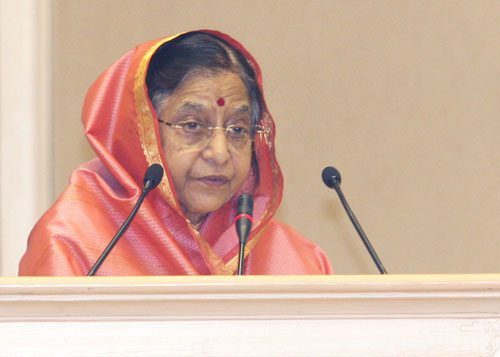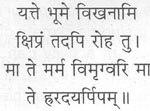Speech by Her Excellency the President of India Shrimati Pratibha Devisingh Patil at the Presentation of Ndtv's Environment Awards 'the Greenies'
New Delhi : 07.12.2010
 Ladies and Gentlemen,
Ladies and Gentlemen,
I am very happy to be participating in this function for the presentation of NDTV's Environment Awards - The Greenies. These Awards are a recognition of the environmental consciousness shown by individuals, institutions, organizations and business enterprises. I congratulate NDTV for taking this initiative. Media has an important role to play in creating awareness, and when it chooses to profile subjects like environment, it as a responsible stakeholder, becomes a contributor in making our world more livable and in balance with nature. I am also aware that apart from these Awards, NDTV has been running a campaign for saving the tiger, our national animal, whose conservation and preservation is an essential strand in maintaining ecological balance.
I congratulate all the award winners among whom are legendary figures like Sunder Lal Bahuguna, Chandi Prasad Bhat, Veer Bhadra Misra, as well as those who are working with deep commitment in following green ethics in their work. It would not be wrong to say, that a few decades ago the subject of environment related challenges had not appeared on our radar screens. Today, environmental degradation is a loud message, and an issue which is unblinkingly staring at us. Climate change has permeated and impacted almost every aspect of our lives - the air we breathe, the water we drink, the food we eat, our agricultural patterns, the habitats in which we live, where a number of species of flora and fauna are becoming endangered, while some are already extinct. In today's world we are faced with a situation where humankind's intelligence and their capacity to survive, will be decided by how creatively we can weave into our development agenda, a degree of responsibility towards the planet, its resources and their sustainability. Just as we need the planet, the planet also needs us to respect it. In this context, everyone has to understand their duty. Our actions, whether as individuals, or as members of an organization, or as countries and the global community, must now inevitably have an undertone of this duty.
Rapacious hunger can fast diminish resources and further reduce space for nature, and the various life forms that it supports. The manner in which we are consuming, we seem to have forgotten that many resources are finite. Are we striking at the very roots of our sustenance? Our unrelenting withdrawal of the Earth's resources has adverse impacts on the Earth itself. For example, is there a study by geologists and seismologists on what impact constant extraction of gas, oil and minerals will have on the crust and on the core of the Earth? Is it likely to cause any disaster in the future? If not, such a study should be undertaken. Our generational responsibility also demands that we do not consume in a manner that we leave a depleted legacy for our children and grandchildren. We should use resources economically and optimally, by consciously adopting practices that are environment friendly and avoiding wastage, be it electricity, paper, water, or any other resource. This will be an important contribution of individuals. Also in this, the concept of equity is very important. The planet belongs to all of us, and situations where one person is wasting precious resources, while another does not even have access for meeting minimum requirements, is a situation that is unacceptable.
Organizations and business enterprises are stakeholders for a green movement. Companies and institutions, both in the private and the government sector, which today have been conferred awards, prove that this is possible. I take the opportunity to refer to the 'Roshini' programme started about two years ago, to create a sustainable habitat in Rashtrapati Bhavan, which is a large urban estate. This initiative has waste management, energy efficiency and usage of new and renewable energy as essential components. The effort was to create awareness and a sense of involvement in each individual living in the Estate, in managing our environs in a responsible manner. I also believe that there is need to create widespread awareness in the entire population, both urban and rural - in colonies, jhuggies and everywhere, about caring for the environment. It should be regularly discussed in Panchayati Raj institutions, municipal bodies and NGOs. I am happy that the subject has been included in the academic curriculum of schools and colleges, to sensitize the younger generation about caring for nature. India is a recognized mega-diverse country, rich in biodiversity and associated traditional knowledge. I am aware that the Government of India has taken a major initiative for creating awareness among children through its National Green Corps. Such movements need further encouragement. Sometimes, non-technical people at the grassroots, invent environment friendly devices, designed to meet their specific requirements. This year in March at Rashtrapati Bhavan, an exhibition of such innovations done by some of our people was held. These need to be studied and further developed technically for broader use.
As a nation, India is committed to contribute, in accordance with its capability, to the global endeavour to deal with climate change. While pursuing policies of economic development and poverty eradication, we have sought to judiciously balance concerns of environment and development. India intends to reduce the emissions intensity of its GDP by 20 percent to 25 percent between 2005 and 2020, and will remain a low-emission economy even in the year 2030. We have in place the National Action Plan on Climate Change, which incorporates the vision of sustainable development, and has identified 8 National Missions that will promote the development of the country, while also yielding benefits for addressing climate change. We also have a mission to reforest 6 million hectares of degraded forests, one of the world's largest afforestation efforts. The past few years have witnessed the introduction of such measures in India that have targeted conservation of rivers, improvement of urban air quality, enhanced afforestation, and a significant increase in the installed capacity of renewable energy technologies. The goal of India's climate change related actions is to ensure sustainable development, which is inclusive in nature, and address issues of poverty eradication.
India however, needs an international environment supportive of its endeavour for ecological sustainable development. The international community should collectively extend support to the efforts of developing countries through financial resources and technology transfer. It should be possible for existing climate friendly technologies to be disseminated at affordable cost. Similarly, there should be research partnerships between developed and developing countries, to work towards cost effective technological innovations. All these essential issues must be included for a meaningful discussion, and effective outcome of the discourse on sustainable development and climate change.
As I emphasized in the beginning, resources of the planet must be managed prudently, which is necessary for our survival and the future of humanity. I am encouraged by the fact that conservation and protection of the environment, as also love for nature have always been a part and parcel of the ethos and traditions of our ancient culture. Our scriptures and epics teach us respect for nature and its five elements - earth, fire, water, air and the sky, as a precondition for peace and harmony in life. The Atharva Veda says: -

Speech
which means:-
O pure Earth, May that we utilize your soil well,
Without causing you injury or harm or
Disturbing any vital element in you.
These words should inspire everybody. I once again congratulate NDTV for its initiative, as well as the award winners for their excellent work.
Thank You.
Jai Hind!








